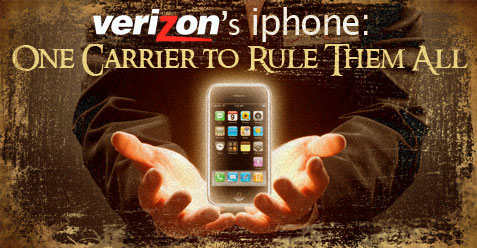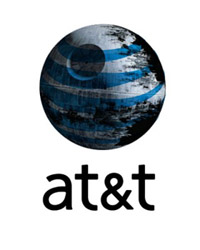
02/04/2011
Gadgets Channel / Bullz-Eye Home
Americans have waited for this day. We've seen the false reports. We've read the misguided predictions. We've heard that Verizon will be getting the iPhone "soon" or "next month" or "in the near future" since the phone first launched with AT&T in 2007. Finally, those rumors are true. Verizon has the iPhone, and the world will be a better place for it, right?
Right. That is, if you believe the hype. I've had a hard time understanding the sentiment our nation's cellular customers seem to share. Will Verizon really make the iPhone that much better? Will people even notice a difference? Yes and no. For the parts of the country that suffered AT&T's poor network planning, mostly New York and San Francisco (though other metropolitan areas had problems), Verizon could be a revelation. The company has been planning this release for years, and it has no doubt seen all of AT&T's bad press. Verizon could trump the AT&T experience in those parts of the country with one simple feature: a phone call that actually goes through. For the rest of the country, though, the difference will probably be fairly minimal. Where I currently live in North Carolina, AT&T is just fine. I rarely drop calls, and I have yet to notice a serious decrease in data performance due to a clogged network.
 Verizon also stands to make the same mistakes AT&T did, even with years of preparation. News broke yesterday that the carrier has started new network management practices that are sure to infuriate the most demanding customers. Verizon is now throttling data speeds for the top 5 percent of data users, some 4.5 million of its 94 million customers. That stranglehold on data could last for the current billing cycle and extend into the next, so that even if you curb your data consumption, you may still see the penalty for months. Verizon will also be compressing multimedia content to help reduce network strain.
Verizon also stands to make the same mistakes AT&T did, even with years of preparation. News broke yesterday that the carrier has started new network management practices that are sure to infuriate the most demanding customers. Verizon is now throttling data speeds for the top 5 percent of data users, some 4.5 million of its 94 million customers. That stranglehold on data could last for the current billing cycle and extend into the next, so that even if you curb your data consumption, you may still see the penalty for months. Verizon will also be compressing multimedia content to help reduce network strain.
It's unfortunate that this kind of news will scuttle a lot of potential purchases for Verizon. Frankly, if AT&T had the foresight to manage the network in these kinds of ways, we probably wouldn't hear about a Verizon iPhone as more than a footnote. While I do think it's bad business to provide limited service to users who pay the same amount as everyone else, five percent isn't exactly egregious. As for the compression, I say good for Verizon. I'm sorry, you don't need 720p on your 3.5-inch screen. You just don't. If I had to choose between uncompressed video with 10 percent network downtime and compressed video with 2 percent network downtime, you can bet I'd choose the latter.
Potential iPhone buyers do need to remember that the phone is slightly different on Verizon. CDMA technology does not currently support data and voice transmission at the same time. It's not a big deal for the majority of users, but those who multitask frequently will really notice the pinch. It means no email while you talk to the office. No Google Maps for directions to the restaurant your friends are at while you make plans for the rest of the night. No Foursquare check-ins while you talk to your mom. No, "haha, look what so-and-so posted on Facebook."
There is at least one major good difference, too. Verizon iPhone customers will be able to turn their handsets into a Wi-Fi hotspot. This is the one feature that almost made me switch to Android, and it could bring a lot of people to the Verizon iPhone. For the uninitiated, this feature allows you to hit a switch and have a mini-network for use with any Wi-Fi device. It's great in a pinch, especially if you need the functionality of a laptop but can't get to a coffee shop. Unfortunately, yesterday's network management announcement might kill this feature. What was once a convenient feature in a pinch now has the potential to put a stranglehold on your account.
For the few potential pitfalls of a Verizon iPhone, plenty of consumers are willing to give it a shot. Just yesterday, Verizon opened limited pre-orders of the device for existing customers. Within two hours the company had sold more devices than on any first-day handset launch in its history, which is even more impressive when you consider those two hours were from 3AM to 5AM. As a point of reference, Verizon sold more than a million units of the first droid phone in its initial 74 days, and the Droid X sold out on day one. Translation: the iPhone is moving fast.
It remains to be seen whether Verizon's network will crumble under the strain or not. According to a study last July, Verizon 3G users scarfed up 25 percent more data than iPhone users, the presumed kings and queens of data consumption. Can the country's most reliable network hope to keep up with flocks of new iPhone users and its existing data hungry users? I hope so. This country needs at least one decent carrier.
You can follow us on Twitter and Facebook for content updates. Also, sign up for our email list for weekly updates and check us out on Google+ as well.









